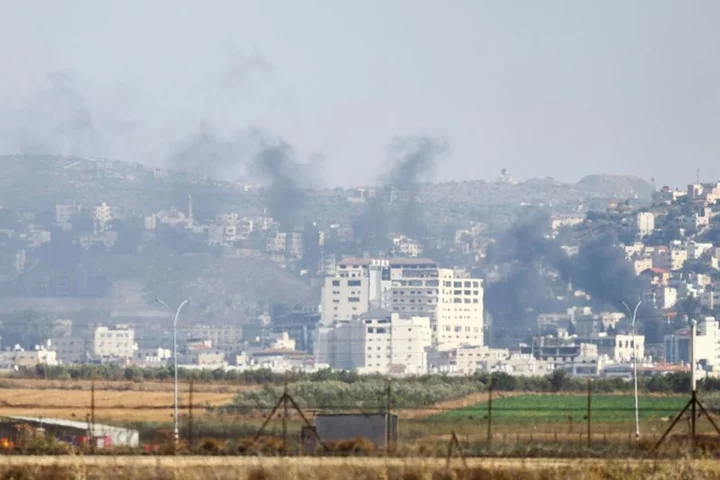By Michael Georgy and Lisa Barrington
DUBAI Public fury is growing in the Arab world over one of Israel's biggest military operations in the occupied West Bank in years, yet Arab states which normalised ties with Israel are unlikely to turn their condemnation of the Israeli assault into action.
Thousands of people were evacuated from the Jenin refugee camp as the Israeli operation continued for a second day on Tuesday, and Palestinian officials said at least 10 people had been killed. Israel says its army is destroying infrastructure and weapons of Iran-backed militant groups in the camp.
The military operation is diplomatically awkward for the four Arab states that have signed peace pacts - known as the Abraham Accords - with Israel, and it makes the already distant prospect of including Saudi Arabia in the U.S.-backed push for normalised ties even more remote.
But analysts said economic and trade interests were likely to trump any moral outrage felt in the Abraham Accord states - Bahrain, the United Arab Emirates, Sudan and Morocco.
"The UAE and Bahrain see the accords as durable and key to their broader national interests," said Sanam Vakil, Director of the Middle East North Africa Programme at The Royal Institute of International Affairs in London.
"But optically, amid the violence, there will be no open embrace of (Israeli Prime Minister Benjamin) Netanyahu and certainly there will be much diplomatic pressure underway to cease Israeli aggression."
FROM CONFLICT TO PROSPERITY
The United States has been working to further expand the Abraham Accords, hoping that they can be leveraged to advance progress on the Israeli and Palestinian conflict.
The hope is also to transform regional conflict to economic prosperity in one of the world's most volatile regions - and although Israeli-Palestinian troubles show no signs of easing, they do not threaten the survival of the Abraham Accords.
"The Israeli incursion of Jenin won't hurt the Abraham Accords. It will of course place the relationship under strain somewhat... (But) it will be business as usual," said Neil Quilliam, associate fellow Middle East and North Africa Programme Chatham House.
The leaders of Israel, the United Arab Emirates and Bahrain signed the Abraham Accords at the White House in 2020. Sudan and Morocco followed later.
Israel, largely cut off economically and politically for decades from its Middle East neighbours, sees them as a way to access new commercial opportunities in the Gulf and beyond.
For example Israel has begun cooperating with the UAE in the finance, energy, water, security, technology and other sectors, and in March this year a free trade agreement, Israel's first with an Arab state, came into effect.
However, Israel's rapprochement with the Arab states has not been a smooth ride - and it has not been made any easier by the advent of a coalition government under Netanyahu that includes hardcore rightist parties who want to annex Israeli-occupied West Bank land where Palestinians have long sought to establish an independent state.
Palestinian officials say they feel betrayed by their Arab brethren for reaching deals with Israel without first demanding progress toward the creation of a Palestinian state. Previously, only two Arab states - Egypt and Jordan - had forged full ties with Israel.
LIMITED ACTION
The Abraham Accord states still complain about Israeli policy towards the Palestinians whenever violence spikes, but only limited action follows.
Bahrain on Tuesday condemned the Israeli assault on Jenin and called for a revival of the long-stalled peace process.
The UAE's foreign ministry called for an immediate end to what it called repeated and escalating campaigns against the Palestinian people.
Morocco said in June it would delay until after the summer a summit of the Abraham Accords nations it is due to host in protest over Israel's decision to expand settlement building in the occupied West Bank and after an earlier Israeli raid on Jenin in which five people were killed. But it went no further.
Israeli hopes of normalising ties with wealthy regional heavyweight Saudi Arabia had already faded long before the latest Jenin violence. Riyadh has said normalisation is not possible until Palestinian statehood goals have been addressed.
U.N. aid agencies have expressed alarm at the scale of the latest Israeli military operation in Jenin, while the internationally backed Palestinian Authority said it was suspending contacts with Israel.
However, the PA has lost a lot of support among Palestinians and international reaction to Israel's incursion has been quite muted. The United States said it respected Israel's right to defend itself but said it was imperative to avoid civilian casualties.
Commenting on his country's burgeoning relationship with the UAE, Israel's ambassador to that country, Amir Hayek, told Reuters in an interview last month: "It's not that we don't have disagreements (with the UAE)." But, he added, it is a relationship that has "passed the point of no return".
(Writing by Michael Georgy; Editing by Gareth Jones)









